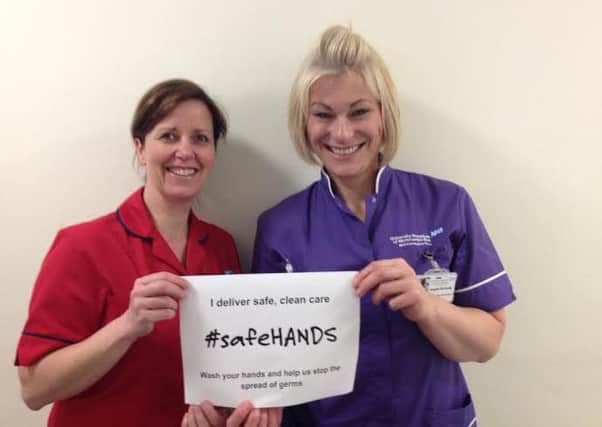C Diff infection rates at all time low at the Royal Lancaster Infirmary


This is another step towards the University Hospitals of Morecambe Bay NHS Foundation Trust’s aim of providing harm-free care to patients and reducing avoidable health-care associated infections.
Angela Richards, Infection Control and Prevention Matron, said: “This is significant in our strive to reduce avoidable harm and is once again testament to the great work of staff across the trust.
Advertisement
Hide AdAdvertisement
Hide Ad“The highly visibly prevention and control team is working closely with clinicians, estates and facilities in supporting safe clean care across our hospitals.”
The C diff infection is a bacterial infection that can affect the digestive system. It most commonly affects people who have been treated with antibiotics.
The symptoms of a C diff infection can be mild or severe and include diarrhoea, a high temperature (fever) of above 38C (100.4F) and painful abdominal cramps.
A C diff infection can lead to life-threatening complications such as severe swelling of the bowel from a build-up of gas (toxic megacolon).
Advertisement
Hide AdAdvertisement
Hide AdSpores of the C diff bacteria can be passed out of the human body in faeces (stools) and can survive for many weeks, sometimes months, on objects and surfaces.
If you touch a contaminated object or surface and then touch your mouth or nose, you can ingest the bacteria. The C diff bacteria do not usually cause problems in healthy people.
However, some antibiotics can interfere with the natural balance of normal bacteria in the gut that protects against C diff infection. When this happens, C diff bacteria can multiply and produce toxins (poisons) that cause symptoms such as diarrhoea.
Sue Smith, Executive Chief Nurse, said: “I am delighted that we are seeing our longest period of being C diff infection free at the RLI for the second time this year.
Advertisement
Hide AdAdvertisement
Hide Ad“I’d like to thank our infection prevention and control matron, Angela Richards and her team, and all our front-line staff, especially our domestic staff who play a vital role in making sure our hospitals are clean and safe. This is great news for our trust.
“Our work to keep our hospitals infection-free continues on a daily basis but we still need the help of all our patients, visitors and staff to keep it this way.
“All visitors, patients and staff are reminded to wash their hands on entering and leaving our hospitals, especially when visiting wards, by using soap and water or the free alcohol hand gel provided.
“I’d also like to remind visitors not sit on the beds when they’re visiting family and friends and instead, use the chairs provided.
Advertisement
Hide AdAdvertisement
Hide Ad“Please do not bring any flowers, plants or food onto the wards. If you wish to send a patient flowers, please wait until they return home to do this.
“Finally, I would ask that you do not visit any of our hospitals if you have a cold, infection or stomach upset or you have suffered from diarrhoea or vomiting until you have been symptom free for at least 48 hours.
“It is important to make sure you drink plenty of fluids to reduce your risk of dehydration. It is also important that you stay away from work, school, hospitals, GP surgeries etc. until you have had no symptoms for at least 48 hours due to the high contamination risk.”